

The Sundarbans, faces unprecedented health challenges as climate change intensifies environmental degradation in this ecologically sensitive region. This low-lying deltaic ecosystem, home to over 4.5 million people, is experiencing severe health implications due to rising sea levels, increased salinity, extreme weather events and ecosystem disruption. The intersection of climate change with existing socio-economic vulnerabilities has created a complex web of health problems that disproportionately affect the most vulnerable populations, including children, women and marginalized communities who depend on natural resources for their survival.
Water-Related Health Crises and Communicable Diseases
The Sundarbans region is experiencing a devastating water crisis that has become the primary driver of health problems in the area. Rising sea levels and increased storm surges have led to saltwater intrusion into freshwater aquifers, rendering traditional water sources unsafe for consumption. This salinization of drinking water has created a cascade of health problems that affect every aspect of community life. The Indian Sundarbans District experiences annual outbreaks of communicable waterborne diseases, resulting in high mortality rates that have become a persistent public health emergency.
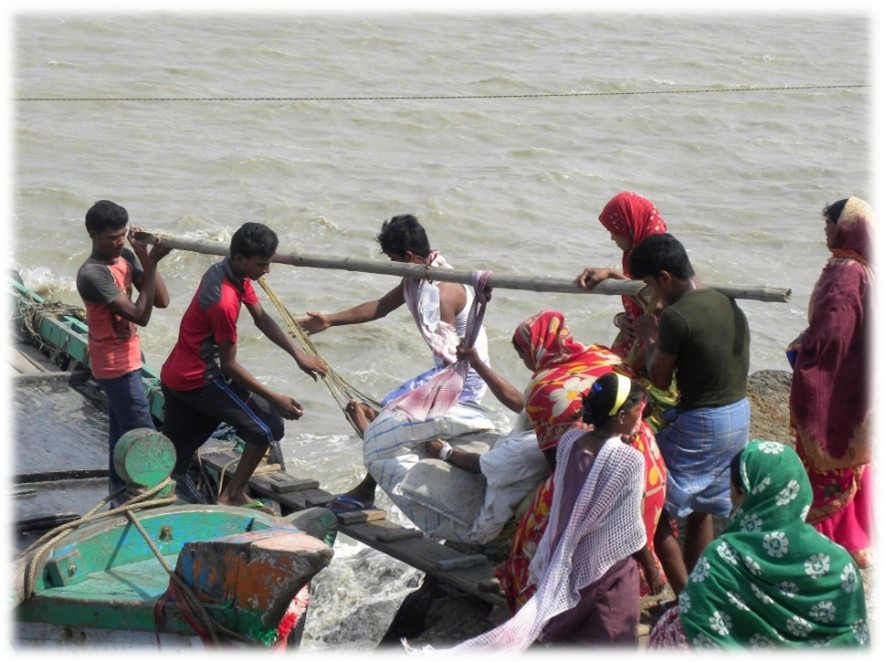
According to World Bank reports, approximately 225 Sundarbans residents die annually from diarrhea alone, with around 1.5 million cases of waterborne illnesses reported each year. The contaminated water supply has become a breeding ground for cholera, dysentery, hepatitis A, typhoid and other communicable diseases that spread rapidly through communities lacking adequate sanitation infrastructure. The situation is particularly dire during the monsoon season when flooding further contaminates already compromised water sources, creating ideal conditions for disease transmission.
The lack of access to safe drinking water has forced many communities to consume brackish water with elevated salt content, leading to immediate health complications including severe dehydration, electrolyte imbalances and gastrointestinal disorders. Children are particularly vulnerable to these conditions, as their smaller body mass and developing immune systems make them more susceptible to the harmful effects of contaminated water consumption.
Salinity-Induced Health Complications
The progressive salinization of the Sundarbans environment has created a unique set of health challenges that extend far beyond water contamination. Climate change has driven progressive river salinization in the low-lying coastal areas, fundamentally altering the chemical composition of the environment in which communities live and work. Villagers in blocks of North and South 24 Parganas have been reporting increasing incidents of skin ailments, discoloration and endocrinological disorders directly linked to prolonged exposure to high-salinity environments.
The consumption of saline water has led to a range of cardiovascular complications, including hypertension and heart disease, as the human body struggles to process the excessive sodium intake. Long-term exposure to high salinity levels has been associated with kidney dysfunction, as the organs work overtime to filter out excess salt, leading to chronic kidney disease in many community members. The dermatological impacts are equally severe, with residents experiencing persistent skin infections, rashes and other dermatological conditions that resist conventional treatment methods.
Workers in the region, primarily women engaged in fishing and aquaculture activities, suffer from occupational health issues including PIDs, problems with eyesight and various skin diseases. The high salinity environment has created conditions where minor cuts and abrasions become infected more easily, leading to chronic wounds that are difficult to heal in the harsh environmental conditions.
Nutritional Deficiencies and Food Security Challenges
Climate change has severely compromised food security in the Sundarbans, leading to widespread malnutrition and dietary deficiency diseases. The increasing salinity in soil and water has made traditional agriculture nearly impossible, forcing communities to abandon crops that have sustained them for generations. The degradation of agricultural land has resulted in reduced crop yields and limited dietary diversity, creating conditions conducive to malnutrition, particularly among children and pregnant women.
The disruption of traditional fishing patterns due to changing water conditions and ecosystem degradation has reduced protein availability in local diets. Fish populations have declined or migrated to different areas, leaving communities without their primary source of protein and essential nutrients. This protein deficiency has contributed to stunted growth in children, anemia in women, and overall weakened immune systems across the population.
The lack of fresh fruits and vegetables due to soil salinization has led to widespread micronutrient deficiencies, including vitamin A, vitamin C, iron and zinc deficiencies. These nutritional gaps have resulted in increased susceptibility to infectious diseases, delayed wound healing, and impaired cognitive development in children. The situation is compounded by limited access to diverse food sources due to geographic isolation and economic constraints.
Mental Health and Psychological Impacts
The psychological toll of climate change on Sundarbans communities has been profound and far-reaching, with mental health disorders significantly increasing following extreme weather events. After Cyclone Aila in 2009, mental health issues including post-traumatic stress disorder, anxiety and depression became prevalent throughout the region. The constant threat of natural disasters, combined with the gradual loss of traditional livelihoods and environmental degradation, has created a persistent state of psychological stress among residents.
The uncertainty surrounding future climate impacts has led to chronic anxiety and depression, particularly among adults who bear the responsibility of providing for their families in increasingly challenging conditions. The loss of traditional knowledge and cultural practices due to environmental changes has created a sense of displacement and cultural grief that affects entire communities. Women, who often bear the brunt of resource scarcity and family care responsibilities, experience particularly high levels of stress and anxiety.
Children in the region show signs of developmental trauma related to repeated exposure to extreme weather events and environmental instability. The disruption of educational systems due to frequent flooding and infrastructure damage has created additional psychological stress for young people, affecting their long-term development and mental health outcomes.
Gender-Specific Health Impacts on Women
Women in the Sundarbans face disproportionate health impacts from climate change due to their traditional roles in water collection, food preparation, and family care. The increased difficulty in accessing clean water has placed additional physical and time burdens on women, who must travel longer distances to find safe water sources. This increased workload has led to physical exhaustion, musculoskeletal problems, and reduced time for self-care and income-generating activities.
Reproductive health issues have become increasingly common among women in the region, with high salinity exposure linked to complications during pregnancy and childbirth. The lack of access to clean water and adequate sanitation facilities has increased the risk of maternal infections and complications during delivery. Many women report irregular menstrual cycles and fertility problems that they attribute to environmental stressors and poor nutritional status.
The psychological stress of managing household needs in the face of resource scarcity has contributed to high rates of depression and anxiety among women. The increased domestic violence rates, partly attributed to economic stress and resource conflicts, have created additional health risks for women in the region. Limited access to healthcare services due to geographic isolation and damaged infrastructure has left many women without adequate medical support during critical health events.
Pediatric Health Crises and Child Development
Children in the Sundarbans face a multitude of health challenges that threaten their immediate well-being and long-term development. The high incidence of waterborne diseases among children has created a cycle of illness that impairs physical growth and cognitive development. Chronic diarrhea and frequent infections have led to malnutrition and stunted growth in many children, with long-term consequences for their physical and intellectual development.
The consumption of saline water by children has resulted in early onset of cardiovascular problems and kidney dysfunction, conditions typically associated with adult populations. The developing nervous systems of children are particularly vulnerable to the effects of dehydration and electrolyte imbalances caused by contaminated water consumption. Skin conditions and respiratory problems are common among children due to exposure to polluted air and water.
Educational disruption due to frequent flooding and infrastructure damage has affected the cognitive development and future prospects of children in the region. Many children are forced to participate in labor activities to support family income, further compromising their health and development. The lack of adequate nutrition during critical growth periods has resulted in irreversible developmental delays that will affect these children throughout their lives.
Community-Wide Health System Challenges
The health system in the Sundarbans faces enormous challenges in addressing the complex health needs of the population. Healthcare infrastructure is frequently damaged by storms and flooding, leaving communities without access to essential medical services during critical times. The isolation of many communities makes it difficult to deliver emergency medical care and regular health services.
During extreme weather events, water, sanitation and hygiene facilities in emergency shelters are often inadequate, making life particularly difficult for vulnerable populations including the elderly, pregnant women and persons with disabilities who require constant care and assistance. The lack of skilled healthcare providers willing to work in remote and challenging conditions has created gaps in medical care that affect all community members.
The traditional knowledge systems that communities have relied upon for healthcare are being disrupted by environmental changes, leaving people without familiar treatment options. The increased prevalence of new diseases and health conditions requires medical interventions that are often unavailable or inaccessible to remote communities. The economic burden of healthcare costs has become insurmountable for many families already struggling with climate-related income losses.
Occupational Health and Economic Impacts
The changing environment has created new occupational health hazards for workers in the Sundarbans. Fishermen and aquaculture workers face increased risks of injury and disease due to rough seas and unpredictable weather conditions. The high salinity environment has created conditions where occupational injuries are more likely to become infected and heal more slowly. Agricultural workers who have attempted to continue farming in saline conditions face unique health challenges including respiratory problems from salt-laden air and skin conditions from contact with contaminated soil.
The lack of alternative employment options has created situations where people must choose between immediate economic survival and long-term health consequences. This economic pressure has particularly affected women and young people who may engage in risky occupations out of necessity.
SEED has developed a comprehensive One Health approach to address the escalating health challenges in the Sundarbans region. This integrated framework recognizes that human health is intrinsically connected to environmental health, creating sustainable solutions for climate-resilient communities. SEED's approach addresses the complex intersection of climate change, environmental degradation and public health through four strategic pillars that work synergistically to build long-term community resilience.
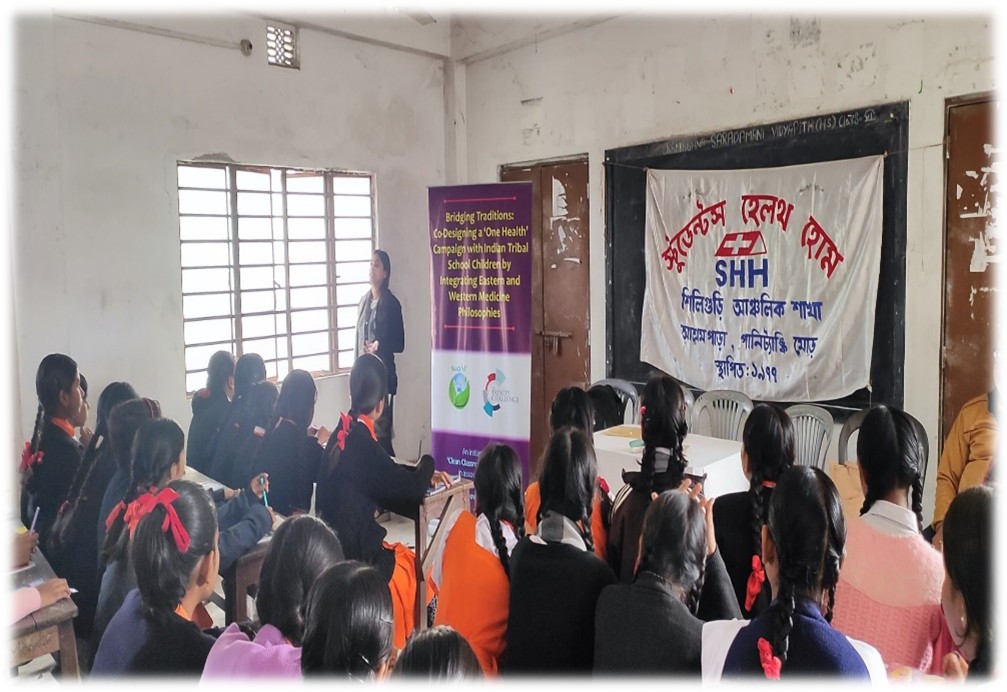
SEED's first pillar focuses on building community knowledge and capacity through targeted awareness programs across multiple platforms. This comprehensive education strategy empowers communities with practical knowledge to protect themselves from climate-related health risks while fostering behavioral changes that promote long-term health and well-being.
School-Based Health Education Programs
SEED implements integrated health education curricula in schools across the Sundarbans, Darjeeling and Purulia; training children as health ambassadors who carry vital health messages to their families and communities. These programs teach essential skills including safe animal handling practices, proper hygiene protocols and environmental health awareness. Students learn practical techniques for safe water storage, waste management and early recognition of waterborne diseases. The school-based approach creates a multiplier effect, as children become advocates for health practices in their households and communities.
Health Center Capacity Building
SEED implements integrated health education curricula in schools Healthcare workers and community health volunteers receive specialized training to deliver climate-sensitive health services. These programs build capacity in antimicrobial resistance prevention, addressing food insecurity and health related problems amongst children and mothers. Healthcare workers are equipped with educational materials and tools to conduct community outreach programs, extending health education beyond formal healthcare settings. The training emphasizes the One Health approach, helping healthcare providers understand the connections between environmental health and human health outcomes.
Community-Level Awareness Initiatives
SEED conducts targeted awareness programs through women's self-help groups, community meetings and traditional gathering spaces. These initiatives focus on critical health issues including menstrual hygiene management in challenging environmental conditions, maternal health during extreme weather events. The programs address misconceptions about health practices and promote evidence-based approaches to community health management, ensuring that health information is culturally appropriate and accessible to all community members.
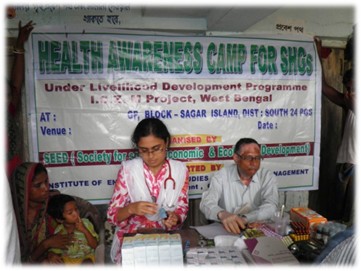
SEED's second pillar provides immediate healthcare services through mobile health camps and integrated service delivery systems. These services bridge the gap between formal healthcare systems and remote communities, ensuring that essential medical care reaches the most vulnerable populations during times of greatest need.
Mobile Health Camps
Strategically located mobile health camps serve isolated communities that lack access to formal healthcare facilities. These camps provide comprehensive medical services including treatment for waterborne diseases, management of salinity-related health conditions and screening for chronic diseases such as hypertension. Medical professionals are trained to recognize and treat climate-related health conditions, ensuring appropriate care for environmental health challenges. The camps operate year-round, especially during extreme weather events.
Integrated Healthcare Services
Health camps serve as platforms for multiple health interventions, including vaccination programs, nutritional support and health screening services. Each camp includes educational sessions on disease prevention, proper nutrition during food scarcity and home-based care for common illnesses. Community members receive training in basic first aid and emergency response procedures, building local capacity to respond to health emergencies when formal medical care is unavailable. The camps also function as referral centers, connecting patients with specialized medical services in urban areas when necessary.
Health Data Collection and Monitoring
SEED's health camps systematically collect health data that informs broader public health planning and intervention strategies. This data collection helps track disease patterns, identify emerging health threats and evaluate the effectiveness of health interventions. The information is used to advocate for policy changes and resource allocation while contributing to the global understanding of climate-related health impacts in coastal communities.
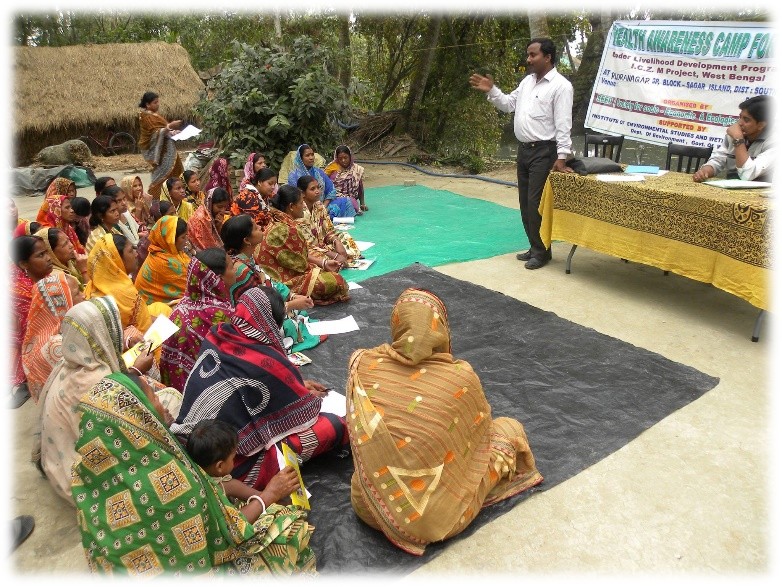
Recognizing the significant psychological impacts of climate change, SEED's third pillar provides comprehensive mental health services that address climate-related trauma and build psychological resilience. This culturally sensitive approach integrates traditional healing practices with evidence-based psychological interventions.
Individual and Group Counseling Services
Mental health counselors provide specialized services for climate-related psychological disorders including post-traumatic stress disorder, anxiety, depression and grief related to environmental loss. Individual counseling sessions offer safe spaces for community members to process their experiences and develop coping strategies for ongoing environmental stressors. Group therapy sessions create peer support networks that extend beyond formal counseling, bringing together individuals with similar experiences to share coping strategies and build community resilience.
Targeted Support for Vulnerable Populations
Special programs address the unique mental health needs of women and children who are disproportionately affected by climate-related psychological stress. Women's support groups help mothers and caregivers manage family needs during environmental crises while addressing their own psychological well-being. Children's programs use play therapy and art therapy techniques to help young people process trauma and develop resilience skills. School-based mental health programs provide ongoing support for students whose education has been disrupted by climate events.
Community Healing and Cultural Preservation
SEED's mental health approach includes community-level interventions that address collective trauma and strengthen social cohesion. Community healing circles and traditional storytelling sessions help preserve cultural identity while processing collective experiences of environmental change. The program trains community leaders and traditional healers to recognize mental health symptoms and provide appropriate support, creating a network of mental health advocates throughout the region.
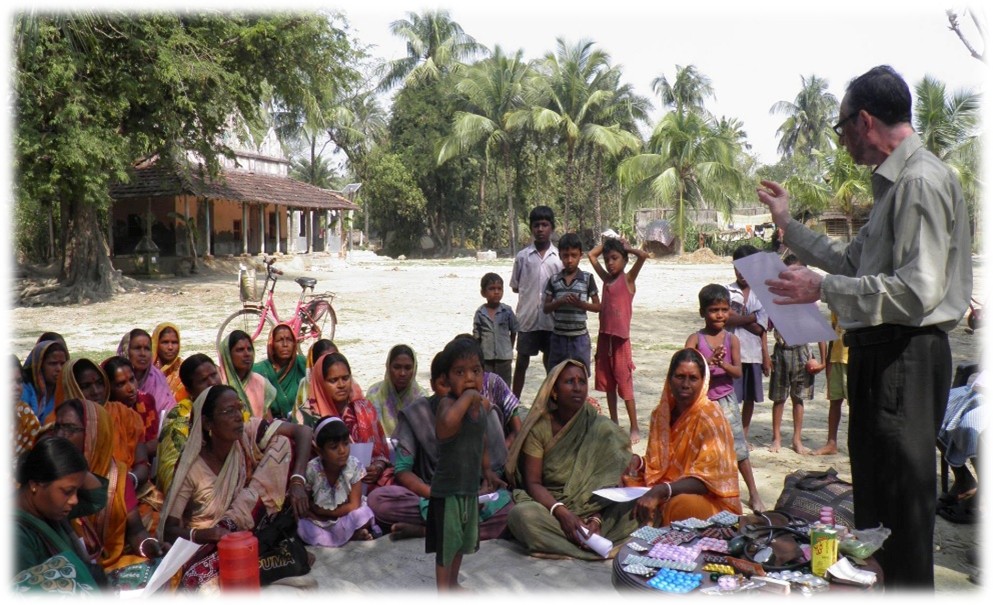
SEED's fourth pillar focuses on generating evidence that informs both local interventions and broader policy recommendations. This research program examines the complex intersections between climate change and health impacts while developing innovative solutions tailored to the Sundarbans environment.
Longitudinal Health Impact Studies
SEED conducts comprehensive longitudinal studies tracking health outcomes in relation to environmental changes, providing critical data on the long-term impacts of climate change on human health. These studies examine relationships between sea level rise and waterborne disease incidence, effects of salinity on maternal and child health, and mental health impacts of repeated climate disasters. The research also investigates the effectiveness of various intervention strategies, providing evidence for scaling up successful approaches.
Community-Based Participatory Research
Research approaches ensure that local knowledge and perspectives are integrated into research design and implementation. Community members are trained as research assistants, building local capacity for data collection and analysis while ensuring that research findings are relevant to community needs. This participatory approach builds trust between researchers and communities, facilitating more accurate data collection and more effective implementation of research findings.
Innovation and Technology Development
SEED's research program focuses on developing innovative solutions and technologies adapted to the unique challenges of the Sundarbans environment. This includes research on water purification technologies suitable for high-salinity environments, sustainable sanitation systems that can withstand flooding, and mobile health technologies that can operate in remote areas with limited infrastructure. Research findings are disseminated through policy briefs, community education materials, and academic publications, ensuring that knowledge generated contributes to broader climate health adaptation efforts.
Integration and Sustainability Framework
SEED's four pillars work synergistically to create lasting change in community health outcomes. The integration of awareness generation, health service delivery, mental health support and research creates a robust system that addresses both immediate health needs and long-term resilience building. This integrated approach recognizes that sustainable health improvements require addressing multiple factors simultaneously rather than implementing isolated interventions.
The sustainability of SEED's approach is built on community ownership and local capacity building. Community health workers are trained to continue delivering services beyond specific project timelines, creating a permanent network of health advocates. Local institutions are strengthened to take on greater roles in health system management, ensuring that improvements in health outcomes are maintained over time. The research component provides ongoing feedback and adaptation mechanisms, allowing the program to evolve in response to changing environmental and health conditions.
SEED's approach emphasizes policy advocacy and systemic change, using evidence generated through their programs to advocate for policy changes at district, state, and national levels. This advocacy work helps create enabling environments for community-level health interventions while addressing structural factors that contribute to health vulnerabilities in climate-affected regions. Through this comprehensive approach, SEED is building a model for climate-resilient health systems that can be replicated in other vulnerable coastal communities worldwide.
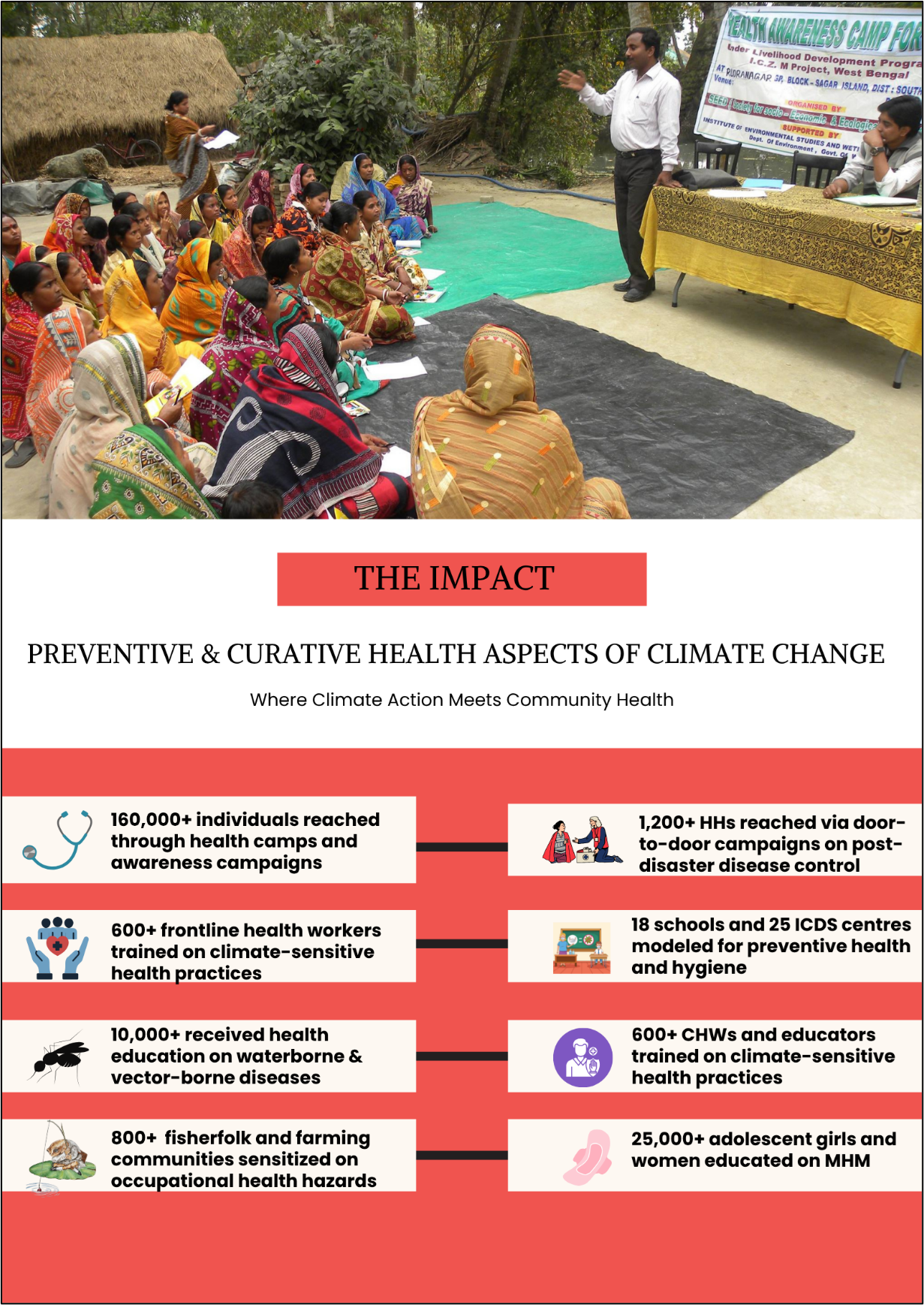



Subscribe to the SEED Newsletter — and be part of the change!